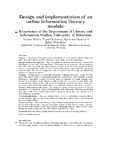| dc.contributor.author | Mutula, S. | |
| dc.contributor.author | Kalusopa, T. | |
| dc.contributor.author | Moahi, K. | |
| dc.contributor.author | Wamukoya, J. | |
| dc.date.accessioned | 2011-03-10T10:32:45Z | |
| dc.date.available | 2011-03-10T10:32:45Z | |
| dc.date.issued | 2006 | |
| dc.identifier.citation | Mutula, S. et al (2006) Design and implementation of an online information literacy module - experience of the Department of Library and Information Studies, University of Botswana. Online Information Review, Vol. 30 No. 2, pp. 168-187 | en_US |
| dc.identifier.issn | 1468-4527 | |
| dc.identifier.uri | http://hdl.handle.net/10311/743 | |
| dc.description.abstract | The purpose of this paper is to present findings of the design and implementation of an
online information literacy module to first-year students at the University of Botswana. The study population consisted of 103 first-year students in the Department of Library and Information Studies. The population was divided into three equal groups of 34, 34 and 35, respectively, and each assigned a two-hour slot in the smart computer laboratory weekly for five consecutive weeks, to cover five information literacy topics online. Each group was assigned a tutor who received assignments online and graded them. Each topic was followed by
questions for students to answer.
Findings generally revealed that impartation of information literacy through the online mode could improve students’ competencies perhaps more than the face-to-face instruction approach. Furthermore, respondents preferred a blended instruction approach to a single learning mode. Contrary to expectations, online instruction might not minimise the copying of each other’s work among students to a great extent. Finally, online instruction does not necessarily reduce the amount of
workload for staff and students, instead more time is needed to design and administer the course. The study was limited to first year students in the LIS
department. A similar study involving all departments in the University of Botswana would shed
more light on the level of information literacy competency among first year students from a
cross-disciplinary perspective. The major outcome of the study is a re-usable online information literacy
module. The study findings could also be useful in developing interventions to improve the design and delivery of online courses. Information literacy is a key challenge facing educators all over the world. Case
studies such as this provide unique and comparative experiences that advance existing knowledge. For the University of Botswana, the study provides a first insight into the impact of elearning on information literacy competency since the implementation WebCT in 2002. | en_US |
| dc.language.iso | en | en_US |
| dc.publisher | Emerald | en_US |
| dc.subject | Information literacy | en_US |
| dc.subject | Digital libraries | en_US |
| dc.subject | Communication skills | en_US |
| dc.subject | E-learning | en_US |
| dc.subject | Botswana | en_US |
| dc.title | Design and implementation of an online information literacy module - experience of the Department of Library and Information Studies, University of Botswana | en_US |
| dc.type | Published Article | en_US |
| dc.link | http://www.emeraldinsight.com/ | en_US |

